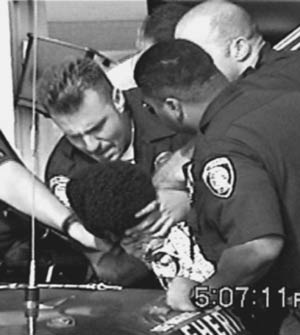![]()
Write us!
[email protected]
The Historic Role of Police Brutality in the Black Community
By Roland Sheppard
 An important part of Black history is the post-Civil War policy of the destruction of Reconstruction, which lasted for a decade after the Civil War, and the establishment of Jim Crow in the South and racial segregation in the North. (Reconstruction officially ended with the “Compromise of 1876.”)
An important part of Black history is the post-Civil War policy of the destruction of Reconstruction, which lasted for a decade after the Civil War, and the establishment of Jim Crow in the South and racial segregation in the North. (Reconstruction officially ended with the “Compromise of 1876.”)
Reconstruction was initiated by the Radical Republicans who had a majority of Congress. They were advocates and fighters for racial equality. Their position was that the former slaves (freedmen), who were homeless, landless, and uneducated, had to be rewarded for their loyalty to the union and needed to be made whole in order to have equality.
The Radical Republicans tried to enforce the Confiscation Act of July 1862. This act included giving land to the former slaves (“40 acres and a mule”). They also set up the Freedmen’s Bureau, designed to provide education, health, and welfare for Black people in the transition from slavery to freedom.
President Johnson, who came into office after the assassination of Abraham Lincoln, defended the former Southern Slavocracy and violated the law of the land as passed (over Johnson’s veto) by the Radical Republicans in Congress. Johnson’s argument was that Congress was illegal, for it did not include the former Confederate states, who committed treason by seceding from the union and founding the Confederacy.
In response to Johnson’s refusal to enforce “the law of the land,” the Radical Republicans tried unsuccessfully to impeach him. (They lost by one vote. If Johnson had been impeached, Benjamin Wade, who was an advocate of a law providing the formers slaves with “40 acres and a mule,” advocated Black and women’s suffrage, and radical Reconstruction, would have become President.)
President Johnson ended the Freedmen’s Bureau and opposed all actions to give freed male slaves the right to vote. He refused to enforce the law when former slaves were prevented from exercising their rights by force and violence by the Southern police forces and/or the Ku Klux Klan, which was formed in 1865. He also supported the Black Codes passed by several Southern states.
These codes said that unemployed Blacks were vagrants, who could be arrested and hired out to the highest bidder and forced to work for that person for a prescribed time. Employers were also given the right to physically punish these workers. These codes also made it illegal for Blacks to bear arms.
It was the police and the Ku Klux Klan’s illegal force and violence (terrorism), along with the Democratic Party and reactionary Republicans who pushed for restoring the property rights of the former slave owners. These were the forces rhat laid the basis for the overthrow of Black Reconstruction after the Civil War and the institutionalization of legal segregation (Jim Crow). Blacks were then and continue to be subject to lynch law and other violations of their civil and human rights, which were designed to enforce segregation.
Based on a Report by the Harvard Civil Rights Project.
Write us
[email protected]